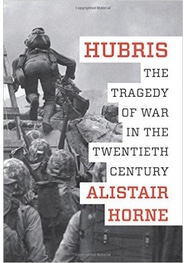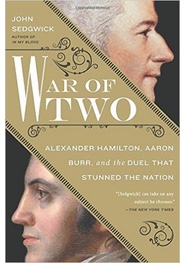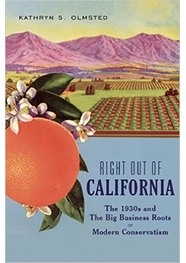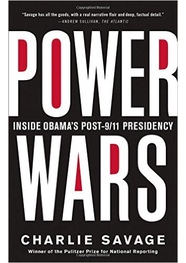NYT History Book Reviews: Who Got Noticed this Week?
Welcome to the latest edition of the last show on Earth--the reason people still use bookmarks, grow Dostoevsky beards, and buy $9 frappucinos. The somewhat weekly publication that’ll inform you of a random fact about Napoleon -- just because -- then pat you on the back for having the fortitude to recite it at the local powwow.
Napoleon had an acute sense of smell, and one of the things that bothered him was paint. Thankfully, this isn’t an art website. Anyway, let’s dig in.
Book: Hubris: The Tragedy of War in the Twentieth Century
Summary (Via Amazon): “Sir Alistair Horne has been a close observer of war and history for more than fifty years and in this work, he revisits six battles of the past century and examines the strategies, leadership, preparation, and geopolitical goals of aggressors and defenders to reveal the one trait that links them all: hubris.
“In Greek tragedy, hubris is excessive human pride that challenges the gods and ultimately leads to total destruction of the offender. From the 1905 Battle of Tsushima in the Russo-Japanese War, to Hitler's 1941 bid to capture Moscow, to MacArthur's disastrous advance in Korea, to the French downfall at Dien Bien Phu, Horne shows how each of these battles was won or lost due to excessive hubris on one side or the other. Horne provides a detailed analysis of the ground maneuvers employed by the opposing armies in each battle. He also explores the strategic and psychological mindset of the military leaders involved to demonstrate how devastating combinations of human ambition and arrogance led to overreach. Making clear the danger of hubris in warfare, his insights hold resonant lessons for civilian and military leaders navigating today's complex global landscape.”
Author: Alistair Horne is a British journalist, biographer and historian of Europe. In 1970, he founded a research Fellowship for young historians at St Antony's College, Oxford. Apparently, a year in Oxford can be too much fun, unless you are enrolled in one of these college classes.
Reviewer: Max Boot is an author, military historian, and a senior fellow at the Council on Foreign Relations. He was featured on HNN back in 2005 in a reprint.
Reviewer highlights
“…unsatisfying…
“…he has failed to produce a narrative remotely as dramatic as those he is known for in past books…
“Horne begins with a sweeping assertion: Over the ages ‘wars have generally been won or lost through excessive hubris on one side or the other.’ But is this true? Aren’t a lot of wars won or lost simply because one side has superior skill or will — not necessarily because the other side is guilty of ‘supreme arrogance’? What about conflicts where the leaders on both sides — say Hitler and Stalin, or Saddam Hussein and Ayatollah Khomeini — were pretty prideful: How does hubris decide who wins or loses?
“Horne does not come close to proving his thesis. Nor does he really try.
“There is nothing wrong with building a book around accounts of multiple, unrelated battles. This has been a staple of military history since Edward Shepherd Creasy published The Fifteen Decisive Battles of the World in 1851. The trick is to provide some kind of organizing principle to justify the choice of topics and to spin out an interesting thesis from the historical raw materials. Horne fails on both counts.
“All that said, Horne is a skilled writer, and Hubris makes for good reading. He has an eye for amusing aphorisms and shocking anecdotes ... And he knows how to move a story along.
“Horne’s writing is marred only by frequent resort to clichés that sound as if they come from a Victorian boys’ adventure story: Thus, Turkish soldiers are ‘doughty fighters’ and Finland is a ‘small but doughty nation’; a Japanese militarist is an ‘evil genius’; German soldiers in World War I are ‘Moltke’s and Tirpitz’s sturdy Teutons’; and the leader of the Vietminh is ‘a chieftain called Ho Chi Minh.’
Erik Moshe’s Comments: Boot cited Horne in a CFR.org article, "The Consummate Warrior." The last time a boot sighted a horn, it wasn't good for the sole... ask these people from Yellowstone.
Book: War of Two: Alexander Hamilton, Aaron Burr, and the Duel that Stunned the Nation
Summary (Via Amazon): “In the summer of 1804, two of America’s most eminent statesmen squared off, pistols raised, on a bluff along the Hudson River. That two such men would risk not only their lives but the stability of the young country they helped forge is almost beyond comprehension. Yet we know that it happened. The question is why. In War of Two, John Sedgwick explores the long-standing conflict between Founding Father Alexander Hamilton and Vice President Aaron Burr. A study in contrasts from birth, they had been compatriots, colleagues, and even friends. But above all they were rivals. Matching each other’s ambition and skill as lawyers in New York, they later battled for power along political fault lines that would not only decide the future of the United States, but define it. A series of letters between Burr and Hamilton suggest the duel was fought over an unflattering comment made at a dinner party. But another letter, written by Hamilton the night before the event, provides critical insight into his true motivation. It was addressed to former Speaker of the House Theodore Sedgwick, a trusted friend of both men, and the author’s own ancestor. John Sedgwick suggests that Hamilton saw Burr not merely as a personal rival but as a threat to the nation. Burr would prove that fear justified after Hamilton’s death when, haunted by the legacy of his longtime adversary, he embarked on an imperial scheme to break the Union apart.”
Author: John Sedgwick is a journalist and author. On his personal connection to Hamilton, Sedgwick told RadioBoston: “I developed this idea of wormholes in history, and by that I mean there are certain documents, ideas, events, that make the distant past very immediately present … Alexander Hamilton’s last letter that he wrote on Earth was sent to my direct ancestor, Theodore Sedgwick, six generations back, who had been the Speaker of the House in Washington and was a close legislative ally of Hamilton’s.”
Reviewer: Susan Dunn, a professor of humanities at Williams College.
Reviewer highlights
“[A] lively, wide-ranging and immensely readable book. The world of War of Two is often more personal than political, an intimate portrait of Hamilton and Burr as they plunged toward their fatal collision.”
Erik Moshe Comments: I have four links for you this week, the first of which is a must-see video:
● ESPN covers Hamilton Burr Duel
● After 200 Years the Hamiltons Make Up with the Burrs
● What If Aaron Burr Had Missed?
● Burr killed Hamilton in a duel, now their descendants are BFFs
Book: Nut Country: Right-Wing Dallas and the Birth of the Southern Strategy
Summary (Via Amazon): “On the morning of November 22, 1963, President Kennedy told Jackie as they started for Dallas, ‘We’re heading into nut country today.’ That day’s events ultimately obscured and revealed just how right he was: Oswald was a lone gunman, but the city that surrounded him was full of people who hated Kennedy and everything he stood for, led by a powerful group of ultraconservatives who would eventually remake the Republican party in their own image.
“In Nut Country, Edward H. Miller tells the story of that transformation, showing how a group of influential far-right businessmen, religious leaders, and political operatives developed a potent mix of hardline anticommunism, biblical literalism, and racism to generate a violent populism—and widespread power. Though those figures were seen as extreme in Texas and elsewhere, mainstream Republicans nonetheless found themselves forced to make alliances, or tack to the right on topics like segregation. As racial resentment came to fuel the national Republican Party’s divisive but effective ‘Southern Strategy,’ the power of the extreme conservatives rooted in Texas only grew.
“Drawing direct lines from Dallas to DC, Miller’s history offers a fresh understanding of the rise of the new Republican Party and the apocalyptic language, conspiracy theories, and ideological rigidity that remain potent features of our politics today.”
Author: Edward H. Miller is adjunct professor of history at Northeastern University in Boston. He focuses specifically on the rise of American conservatism.
In a Q&A with Dallas News, Miller was asked: “In our politics today, what do you hear of the tone that dominated Dallas in the middle of the last century?” He answered that "I see it echoing throughout the presidential campaign. It’s safe to say that a lot of the incendiary speech has certainly trumped the careful deliberation among the right, and conspiratorial thinking that was long a characteristic of Nut Country in the 1950s is very much in vogue today. Donald Trump consistently doubts the legitimacy of President Obama’s birth certificate. The apocalyptic doomsday rhetoric that ultraconservatives like H.L. Hunt, Dan Smoot, W.A. Criswell used is very much part of politics today. This does little to improve our public discourse."
Reviewer: Sam Tanenhaus, who was the editor of the Book Review from 2004 to 2013, is writing a biography of William F. Buckley Jr., the face of conservative politics in the 1950s-1970s. As quoted in The Book of Positive Quotations, Buckley Jr. once said, “I get satisfaction of three kinds. One is creating something, one is being paid for it and one is the feeling that I haven’t just been sitting on my ass all afternoon.”
Reviewer highlights
“…well-researched and briskly written…
“The only thing wrong with Nut Country is its title, which trivializes a timely, intelligent, penetrating book. Miller, an assistant teaching professor at Northeastern University Global, explains that the epithet was the one Kennedy used to describe Dallas on the morning of Nov. 22, 1963 — the date when ‘city of hate’ assumed its darkest meaning. This isn’t really fair.”
Book: Right Out of California: The 1930s and the Big Business Roots of Modern Conservatism
Summary (Via Amazon): “In a major reassessment of modern conservatism, noted historian Kathryn S. Olmsted reexamines the explosive labor disputes in the agricultural fields of Depression-era California, the cauldron that inspired a generation of artists and writers and that triggered the intervention of FDR’s New Deal. Right Out of California tells how this brief moment of upheaval terrified business leaders into rethinking their relationship to American politics—a narrative that pits a ruthless generation of growers against a passionate cast of reformers, writers, and revolutionaries. Olmsted reveals how California’s businessmen learned the language of populism with the help of allies in the media and entertainment industries, and in the process created a new style of politics: corporate funding of grassroots groups, military-style intelligence gathering against political enemies, professional campaign consultants, and alliances between religious and economic conservatives. The business leaders who battled for the hearts and minds of Depression-era California, moreover, would go on to create the organizations that launched the careers of Richard Nixon and Ronald Reagan. Right Out of California is also a vital chapter in our nation’s political transformation whose echoes are still felt today.
Author: Kathryn S. Olmsted, a historian of anticommunism, is chair of the history department at the University of California, Davis.
Reviewer: Sam Tanenhaus
Reviewer highlights
“…vivid, accomplished narrative…
“Olmsted, the chairwoman of the history department at the University of California, Davis, brightens this bleak picture…
“Olmsted’s correctives are convincing, and she has also dug hard nuggets out of archives and newspaper morgues…”
Erik Moshe Comments: "And who designed the original [California] flag? William Todd, nephew of Mary Todd Lincoln. It's a small historical world."
Book: Power Wars: Inside Obama's Post-9/11 Presidency
Summary (Via Amazon): “Barack Obama campaigned on a promise of change from George W. Bush's ‘global war on terror.’ Yet from indefinite detention and drone strikes to surveillance and military tribunals, Obama ended up continuing-and in some cases expanding-many policies he inherited. What happened? In Power Wars, Charlie Savage looks inside the Obama administration's national security legal and policy team in a way that no one has before. Based on exclusive interviews with more than 150 current and former officials and access to previously unreported documents, he lays bare their internal deliberations, including emotional debates over the fates of detainees held on torture-tainted evidence and acts of war that lacked congressional authorization. He tells the inside stories of how Obama came to order the killing of an American citizen, preside over an unprecedented crackdown on leaks, and keep a then-secret National Security Agency program that collected records of every American's phone calls. Savage also pieces together the first comprehensive history of how American surveillance secretly developed over the past thirty-five years, synthesizing recent revelations and filling in gaps with new reporting. And he provides lucid explanations of legal dilemmas in a way that non-lawyers can understand. Highlighted by new information about the pivotal aftermath to the failed Christmas underwear bombing and the planning for the Osama bin Laden raid, Savage's own eyewitness reporting at Guantánamo, and detailed accounts of closed-door meetings at the highest levels of government, Power Wars equips readers to understand the legacy of Obama's presidency.”
Author: Charlie Savage is a Washington correspondent for the NYT and has been covering post-9/11 legal-policy issues since 2003. He was interviewed by Robin Lindley on HNN back in 2008.
Reviewer: Gideon Rose is the editor of Foreign Affairs and a Former National Security Council official in the Clinton administration. In his op-Ed, “What Obama Gets Right,” Rose wrote:
"The key to Obama’s success has been his grasp of the big picture: his appreciation of the liberal international order that the United States has nurtured over the last seven decades, together with his recognition that the core of that order needed to be salvaged by pulling back from misguided adventures and feuds in the global periphery. The president is variously painted as a softheaded idealist, a cold-blooded realist, or a naive incompetent. But he is actually best understood as an ideological liberal with a conservative temperament—somebody who felt that after a period of reckless overexpansion and belligerent unilateralism, the country’s long-term foreign policy goals could best be furthered by short-term retrenchment. In this, he was almost certainly correct, and with the necessary backpedaling having been accomplished, Washington can turn its attention to figuring out how to get the liberal order moving forward once again."
Reviewer highlights
“[This book] offers a master class in how to think seriously about crucial aspects of the subject.
“Savage provides a comprehensive, authoritative history of the legal side of national security policy making during the Obama years. That might sound dry and forbidding, especially in a book so dense and long (almost 700 pages of text). But anyone truly interested in foreign policy or national security should find it essential and enthralling, thanks to the author’s intelligence, objectivity, legwork and literary skill.
“Savage has the instincts of a journalist but the soul of a wonk. He understands that policy making is about choice, and for every issue discussed — from detention and interrogation of terrorist suspects, to surveillance and targeting, to the White House’s tussles with Congress over war powers — he methodically describes the problems administration officials faced, the options they considered and why they decided as they did. Readers come away understanding not just what happened but why — and the legitimate grounds for agreeing or disagreeing with the choices made.
“Savage walks the reader through dozens of these debates with a sure hand, translating arcane legal reasoning into plain English.
“Savage’s superb book should stand as an indispensable guide to the debate.”
Erik Moshe Comments: 10 Secret CIA Prisons You Do Not Want To Visit




